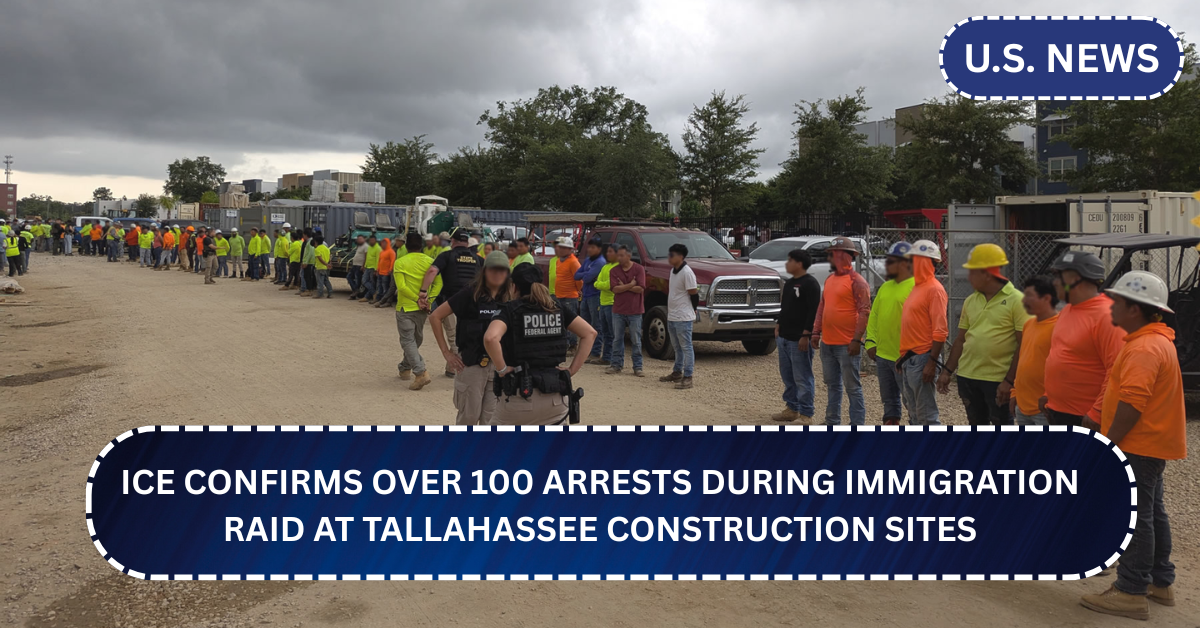ICE (U.S. Immigration and Customs Enforcement) recently carried out a large operation in Tallahassee, Florida, where they arrested more than 100 undocumented immigrants working at several construction sites. This operation has stirred public attention and debate, especially around immigration enforcement and labor in the United States.
The raids took place across multiple active construction projects around the city. According to ICE officials, the individuals detained were believed to be in the country illegally and were working using false documentation or without any valid work authorization. The agency claimed that this was part of an ongoing effort to crack down on unauthorized employment and to protect jobs for American citizens and lawful workers.
Federal agents said they received a tip earlier this year about possible illegal labor practices at several construction sites. After weeks of investigation, surveillance, and coordination with local authorities, ICE launched a targeted enforcement action. In the early hours, agents arrived at the sites, detained workers, and transported them to a federal processing center. Reports suggest that the arrested individuals came from different countries, mainly from Central America, Mexico, and South America.
ICE explained that the action was not just about arresting people but also about holding employers accountable. They are investigating whether the companies that hired these workers knowingly employed undocumented individuals, which is a federal offense. If found guilty, these employers could face heavy fines and even criminal charges.
While ICE defends the operation as a necessary step in enforcing federal law, immigrant rights groups and local activists have criticized the raids. They argue that such actions create fear in immigrant communities, break apart families, and target workers who are simply trying to make a living. Some advocacy organizations have even called the raids “inhumane” and “unjustified,” especially considering the role immigrant labor plays in the construction and service industries across Florida.
Legal experts say that people arrested in the operation could face deportation proceedings unless they can prove lawful status or apply for relief. Many of them, however, may not have access to legal representation or even understand their rights. Groups like the American Civil Liberties Union (ACLU) and other local nonprofits are stepping in to offer legal aid and support for those affected.
Tallahassee residents have shown mixed reactions. Some believe that immigration laws should be strictly enforced, and that jobs should be reserved for those with legal work permits. Others are worried about the human impact, especially on families, as some of the detained individuals are reportedly parents of U.S.-born children. There are also concerns about what this means for local businesses that rely on immigrant labor for construction, landscaping, and other manual jobs.
Economists point out that many sectors, especially construction, are currently struggling with labor shortages. Operations like this, while legal, could further disrupt the availability of workers and delay ongoing projects. Some contractors in the area have already expressed concern over how they will meet deadlines and fulfill contracts following the arrests.
ICE maintains that the action was within its rights and part of its duty to enforce immigration law. A spokesperson said that the agency is focused on upholding the law, ensuring workplace compliance, and removing those who violate immigration regulations. The spokesperson also noted that ICE’s mission is not just about enforcement but also about safeguarding communities and supporting fair labor practices.
This operation is just one of many that ICE has conducted in recent years under broader federal efforts to target undocumented labor. With rising national debates on immigration and border control, such actions are expected to continue, especially in states like Florida that have taken a tougher stance on immigration enforcement.
As the investigation continues, legal outcomes will depend on individual cases, employer records, and federal decisions. For now, over 100 individuals remain in custody, facing an uncertain future, while Tallahassee’s construction sector and immigrant community brace for the ripple effects.




